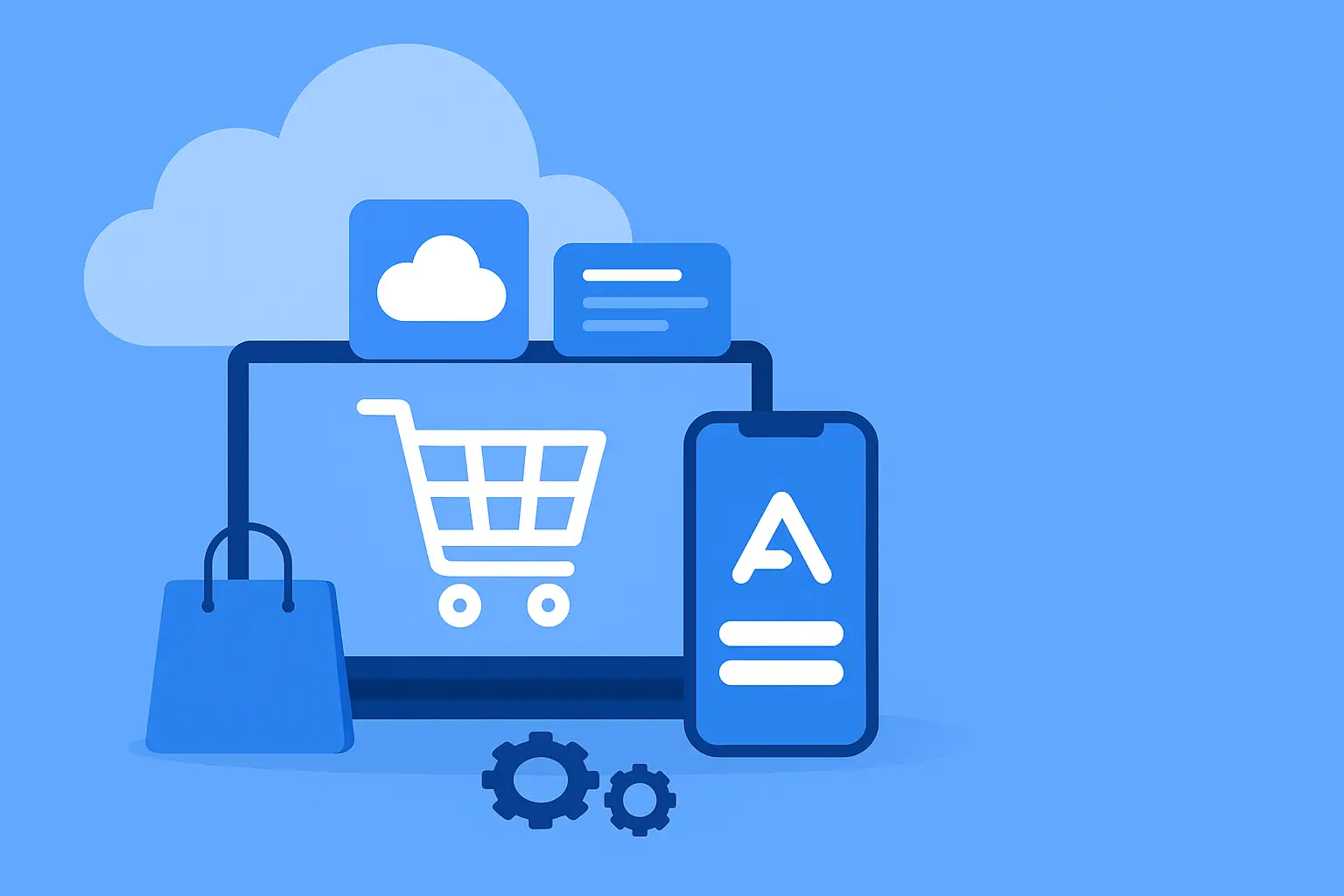Introduction
Cloud computing in e-commerce has become a cornerstone of digital transformation, reshaping how businesses operate and scale. From startups to enterprise-level companies, the adoption of cloud technologies has changed the way e-commerce platforms manage data, deliver seamless customer experiences, and accelerate app development. For organizations aiming to stay competitive in the fast-paced digital economy, leveraging cloud solutions is no longer optional—it’s a necessity.
In this blog, we’ll explore how cloud computing is revolutionizing both e-commerce and app development, the benefits it brings, how it works, and practical ways businesses can adopt it for sustainable growth.

What is Cloud Computing in E-Commerce?
Cloud computing in e-commerce refers to using cloud-based infrastructure, platforms, and software to power online stores and digital applications. Instead of relying on physical servers or in-house IT infrastructure, businesses can host their e-commerce websites, databases, and applications on the cloud.
This shift provides flexibility, cost-efficiency, scalability, and reliability—critical factors for e-commerce businesses dealing with fluctuating customer demands and massive amounts of data.
The Growing Role of Cloud Computing in E-Commerce
E-commerce businesses are data-heavy and highly dependent on customer experience. Cloud solutions are tailored to solve these challenges:
- Scalability during peak seasons (e.g., holiday sales, flash deals).
- Global reach with minimal latency, ensuring faster page load times.
- Stronger data protection with advanced security protocols.
- Integration with AI and analytics, providing insights into customer behavior.
As digital commerce evolves, cloud technology ensures businesses can meet consumer expectations while remaining agile.
Benefits of Cloud Computing in E-Commerce
1. Cost EfficiencyCloud eliminates the need for expensive physical servers and IT maintenance. Businesses pay only for the resources they use, making it budget-friendly.
2. ScalabilityE-commerce stores often experience traffic surges during promotions. With cloud computing, scaling resources up or down becomes seamless.
3. SecurityReputed cloud service providers ensure advanced encryption, firewalls, and compliance with industry standards, safeguarding customer information.
4. Improved Customer ExperienceWith faster loading times, reliable uptime, and integration with AI-driven personalization, cloud-enabled platforms enhance customer satisfaction.
5. Easy IntegrationCloud computing enables businesses to integrate third-party tools such as CRM systems, marketing automation software, and payment gateways effortlessly.
"Cloud computing in e-commerce is not just a trend—it’s a powerful enabler of scalability, security, and innovation that empowers businesses to deliver seamless digital experiences."
How Cloud Computing Works in App Development
App development has also experienced a significant shift with the adoption of cloud computing. Instead of traditional local development environments, developers now use cloud-based platforms to build, test, and deploy applications.
Here’s how cloud computing in app development works:- Cloud Infrastructure (IaaS): Provides developers with scalable virtual servers, storage, and networking.
- Cloud Platforms (PaaS): Offers pre-configured environments for app building, reducing the time needed to set up servers and frameworks.
- Software as a Service (SaaS): Allows developers to integrate ready-made cloud-based applications into their apps (e.g., payment solutions, analytics).
- Continuous Integration/Deployment (CI/CD): Cloud platforms enable faster testing and deployment cycles, reducing time-to-market.
How Businesses Can Use Cloud Computing in E-Commerce
To effectively leverage cloud computing in e-commerce, businesses should follow these steps:
- Choose the Right Cloud Service Provider – Providers like AWS, Microsoft Azure, and Google Cloud offer robust solutions for e-commerce.
- Adopt SaaS Platforms – Instead of building systems from scratch, use SaaS e-commerce solutions for faster implementation.
- Leverage Cloud-Based Analytics – Use real-time insights to track customer behavior and optimize sales strategies.
- Enable Secure Payment Gateways – Cloud-based payment solutions ensure PCI compliance and safe transactions.
- Focus on Scalability – Design your infrastructure to scale automatically during traffic spikes.
Cloud Computing in E-Commerce: Real-World Impact
- Amazon Web Services (AWS): Many e-commerce companies rely on AWS for its scalability and robust security features.
- Shopify: Built entirely on the cloud, enabling businesses of all sizes to start selling without heavy IT investments.
- Netflix (App Example): Although not e-commerce, it’s a prime example of how cloud computing supports seamless global app delivery.
Frequently Asked Questions (FAQ)
Yes, leading cloud providers use advanced encryption, firewalls, and compliance protocols to ensure customer and business data remains safe.
Q2: Can small businesses afford cloud solutions?Absolutely. Cloud services work on a pay-as-you-go model, making them cost-effective even for startups.
Q3: What are the main benefits of cloud computing in app development?The key benefits include faster deployment, reduced infrastructure costs, better collaboration, and seamless scaling.
Conclusion: Embracing Cloud for Future Growth
The impact of cloud computing in e-commerce and app development is undeniable. From enhancing customer experiences to streamlining operations, cloud solutions are driving digital transformation at every level. Businesses that adopt cloud technologies gain a competitive edge, improve scalability, and secure long-term growth.
If your organization is ready to harness the power of cloud solutions for e-commerce and app development, it’s time to take the next step.
👉 Contact Transparent Solutions today to explore how our cloud-based services can elevate your business.


Leave a Comment